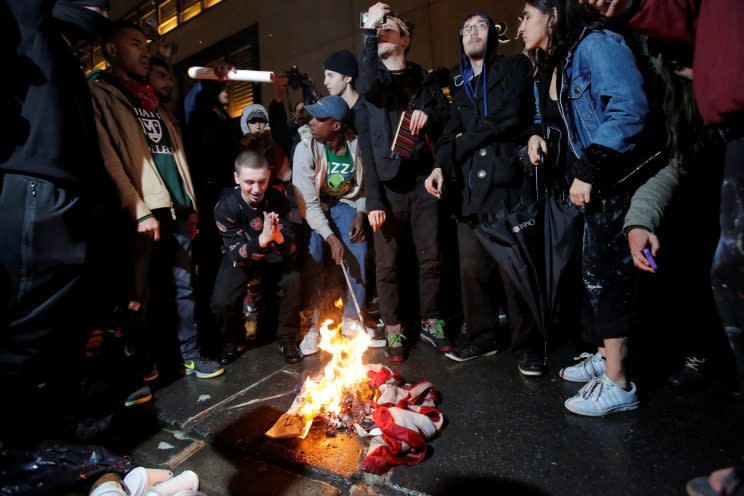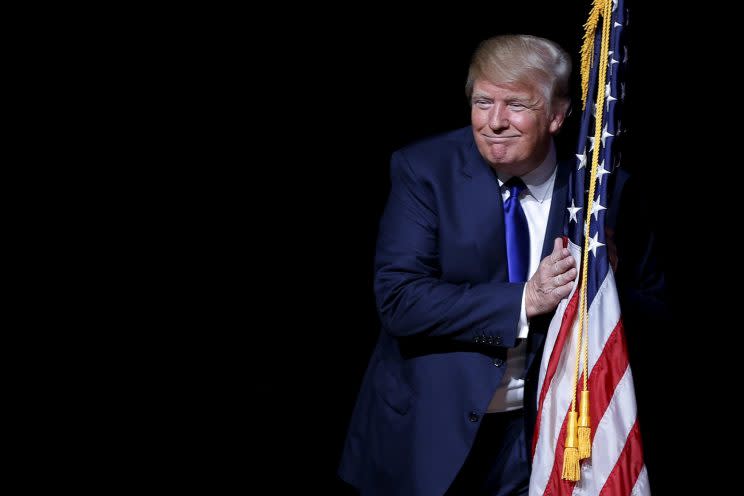Donald Trump: Flag burning should be illegal
President-elect Donald Trump says those who burn the American flag should face punishment.
“Nobody should be allowed to burn the American flag,” Trump tweeted on Tuesday. “If they do, there must be consequences — perhaps loss of citizenship or year in jail!”
Nobody should be allowed to burn the American flag – if they do, there must be consequences – perhaps loss of citizenship or year in jail!
— Donald J. Trump (@realDonaldTrump) November 29, 2016
The Supreme Court disagrees.
In 1989, the court ruled that flag burning was protected as free speech under the First Amendment. The 5-4 ruling came after Gregory Johnson, a Texas protester who had been convicted for violating a state law that prohibited the “desecration of a venerated object,” appealed to the nation’s highest court.
The following year, the Supreme Court again voted in favor to protect flag burning when it ruled that the Flag Protection Act of 1989 — passed by Congress in response to the Texas v. Johnson decision — was unconstitutional.

In 2006, the U.S. Senate voted against an amendment that would have made flag burning illegal.
Kentucky Sen. Mitch McConnell, a Republican, cast the deciding vote.
“I revere the American flag as a symbol of freedom,” McConnell said in a statement explaining his opposition to the amendment. “But behind it is something larger, the Constitution. The First Amendment, which protects our freedom of speech, is the most precious part of the Bill of Rights. As disgusting as the ideas expressed by those who would burn the flag are, they remain protected by the First Amendment.”
“Ultimately, people like that pose little harm to our country,” McConnell added. “But tinkering with our First Amendment might. The solution to such offensive expression is more freedom, not less.”

Trump’s tweet came amid ongoing protests over his election, including one — at Hampshire College in Amherst, Mass. — that involved the lowering and burning of the American flag.
Timing of Trump's tweet lines up w/ Fox segment at 6:25AM on students burning the flag https://t.co/W7G4Hlw1O6 https://t.co/8M0AC4EfQy
— Katherine Faulders (@KFaulders) November 29, 2016
On Sunday, hundreds of U.S. military veterans gathered on the college’s campus to demand the flag be raised. But the school’s administration has refused, saying the flag’s removal is part of an open discussion involving “deeply held beliefs about what the flag represents to the members of our campus community.”
On Tuesday, Trump is scheduled to meet with Pete Hegseth, a U.S. veteran and Fox News contributor whom the president-elect is reportedly considering for secretary of veterans affairs.
.@PeteHegseth: The American flag is for all Americans, not just veterans, but colleges have turned it into a divisive issue. pic.twitter.com/N1vL0dWp7A
— FOX & Friends (@foxandfriends) November 28, 2016
“On college campuses today,” Hegseth said on “Fox & Friends” Monday, “the flag is seen as a divisive issue. They teach that our history is racist, that our history is one of imperialism, that America is not a special or good country. When that happens, you get administrators, you get students and then eventually you get voters who don’t think America is a special place.”
In an interview with CNN, Jason Miller, communications director for Trump’s transition team, refused to acknowledge that flag burning was protected under the Constitution.
“It’s completely ridiculous, and I don’t think there’s a big universe of people out there who support flag burning, and it’s terrible and despicable,” Miller said. “It should absolutely be illegal.”
"Flag burning should be illegal," @JasonMillerinDC says when asked about Trump's tweet about potential punishments. https://t.co/Yp5c4Pcs5l
— New Day (@NewDay) November 29, 2016
Before the election, Supreme Court Justice Ruth Bader Ginsburg compared San Francisco 49ers quarterback Colin Kaepernick’s protest of the national anthem to flag burning.
“I think it’s dumb and disrespectful,” Ginsburg told Yahoo News. “I would have the same answer if you asked me about flag burning. I think it’s a terrible thing to do, but I wouldn’t lock a person up for doing it. I would point out how ridiculous it seems to me to do such an act.”




